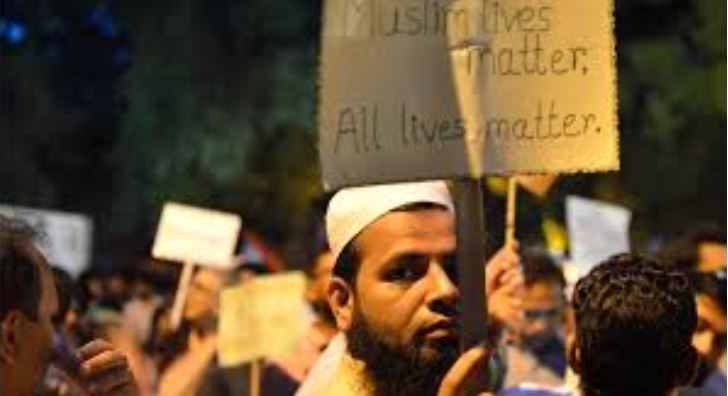Muslim workers publicly stripped, humiliated in vigilante religion checks in UP
Delhi court accepts CBI closure report 9 years after JNU’s Najeeb went missing
MUZAFFARNAGAR: In a disgusting act of religious vigilantism, Muslim workers in Uttar Pradesh, India, were stripped and humiliated to prove their religion by followers of a controversial Hindu seer, Swamy Yashveer Maharaj.
The targeted raids—led by saffron-clad men linked to Swamy Yashveer Maharaj—saw hotel and eatery staff along the Kanwar Yatra route forcibly undressed in public, triggering outrage and condemnation over the rising climate of hate and impunity in India.
In the chilling echo of vigilante moral policing, hotel and eatery workers along the pilgrimage route were allegedly subjected to degrading “religion checks” over the past week. Multiple eyewitnesses and local media reports confirm that the staff — primarily male — were forced to take off their pants to “prove” their religion by followers of Swamy Yashveer Maharaj, a controversial seer linked to earlier acts of public vigilantism.
The incidents occurred along NH-58, a major artery for Kanwar pilgrims heading to Haridwar. Several hotels and roadside dhabas catering to pilgrims were reportedly raided by saffron-clad men affiliated with Yashveer Maharaj’s “Bharatiya Sanatan Suraksha Dal,” a loosely organised outfit known for its aggressive majoritarian campaigns.
Videos that surfaced online — many since deleted or taken down for graphic content — show frightened workers being surrounded and heckled by groups of men, who demand they drop their trousers to prove they are circumcised — a crude and invasive test falsely equated with identifying Muslims.
A Muslim worker at one such dhaba, spoke to a reporter under the condition that his location be withheld for safety reasons. “They came in the name of the yatra, but were shouting, ‘Muslimon ko bhagao (Drive out the Muslims).’ Then they demanded to inspect us,” he said, his voice shaking. “They made us undress. They said if we were Muslims, we were unfit to serve food to the Kanwariyas.”
Another staffer at a hotel on the highway said he was slapped and threatened with public flogging when he refused to comply. “They were livestreaming the whole thing. For them, this was a show of power. For us, it was humiliation,” he said.
At least seven such incidents have been reported from different locations in the Khatauli and Purkazi areas of Muzaffarnagar in the last five days.
Swamy Yashveer Maharaj, who heads a local math near Bhopa, is no stranger to controversy. Known for his inflammatory speeches and social media videos warning against “love jihad” and “Islamic infiltration,” he had previously called for a “Kanwar Corridor cleansing” campaign during a sermon last month.
AIMIM leader Asaduddin Owaisi condemned the incidents, calling them “Taliban-style humiliation on Indian soil.” In a post on X (formerly Twitter), he wrote, “Stripping men to prove their religion is not Hinduism. It’s naked fascism. Where is the government? Where is the Constitution?”
The National Human Rights Commission has reportedly sought a preliminary fact-finding report from local authorities, though no timeline has been set.
This is not the first time religious profiling has surfaced during mass Hindu pilgrimages. In 2022 and 2023, several reports emerged of Muslim vendors being forcibly removed from outside temples during Hindu festivals in Madhya Pradesh and Uttarakhand. What sets this incident apart is the sheer personal violation and the symbolic violence of enforced undressing — echoing dark chapters from history.
Delhi court accepts CBI closure report 9 years after JNU’s Najeeb went missing
Nearly nine years after Najeeb Ahmed, a Jawaharlal Nehru University (JNU) student, went missing, a Delhi court has accepted the Central Bureau of Investigation’s (CBI) closure report in the case.
Najeeb, an MSc student, went missing from JNU on October 15, 2016 soon after he was allegedly assaulted by students affiliated with the Akhil Bharatiya Vidyarthi Parishad (ABVP), the student wing of the Bharatiya Janata Party (BJP).
Najeeb was 27 years old at the time of his disappearance. His mother, Fatima Nafees, filed a missing person complaint, and an FIR was registered in Delhi.
Najeeb’s mother later petitioned the court and the CBI took over the investigation from the Delhi Police in 2017. The CBI filed its closure report in 2018, after which Najeeb’s mother filed a protest petition opposing it.
In the order, Additional Chief Judicial Magistrate Jyoti Maheshwari of the Rouse Avenue Court noted that a “perturbing incident” had taken place before Najeeb went missing, but that it is “ipso facto not sufficient to arrive at the conclusion that the suspects had any role to play in causing the disappearance of Najeeb Ahmed”. However, the court said the case could be reopened if new evidence emerges.
The CBI had concluded its investigation in 2018 after repeated efforts to trace Najeeb failed. It later submitted its closure report to the trial court, having received green light from the Delhi High Court.
Meanwhile, the decision has reignited public anger and concern, especially among student groups and rights activists, many of whom view the closure as an institutional failure. Reactions to the court’s decision have been swift. Student unions, human rights defenders, and civil society organizations expressed disappointment, calling it a travesty of justice. Many pointed out that the state failed to protect one of its own and feared the case would discourage other families seeking justice in cases of enforced disappearances. Even nine years later, Najeeb Ahmed’s disappearance remains one of the most haunting mysteries in contemporary India—one that continues to reflect on the state of justice, accountability, and political impunity.–NNI


